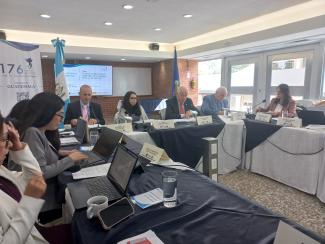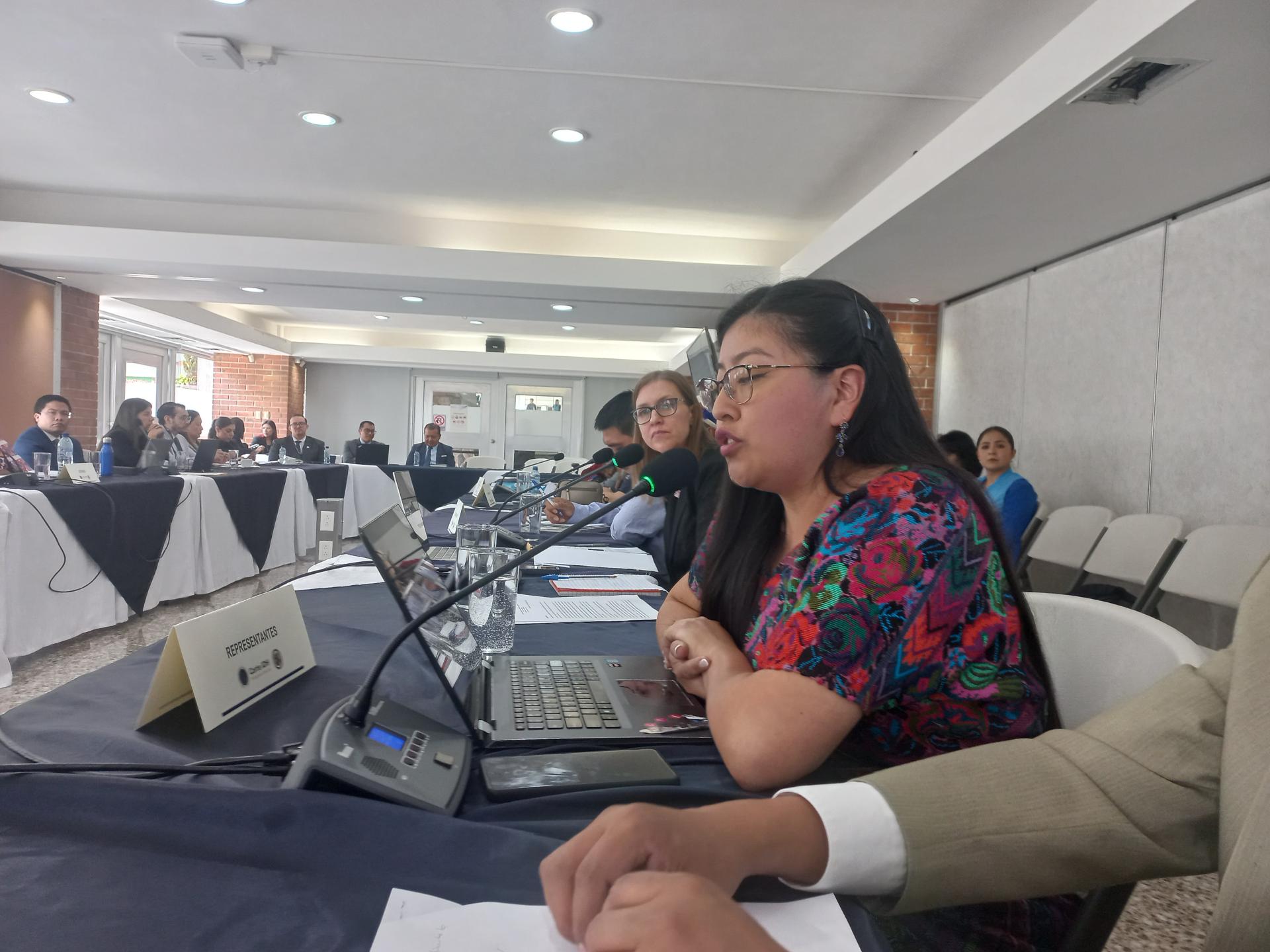
States “cannot invoke their domestic law to avoid fulfilling international obligations,” emphasized Judge Ricardo Pérez Manrique of the Inter-American Court of Human Rights in his ruling on Kaqchikel Maya Indigenous Peoples of Sumpango et al. vs. Guatemala, during a hearing on May 23, 2025. The case, brought by Cultural Survival and Guatemala-based Asociación Sobrevivencia Cultural, submitted with support from Suffolk University Law School’s Human Rights and Indigenous Peoples Clinic, was originally filed on September 28, 2012, arguing that Guatemala’s telecommunications law excludes Indigenous Peoples from accessing their own forms of media via community radio. Judge Pérez pointed to examples of the States of Argentina, Chile, Costa Rica, Ecuador, Panama, and Peru, “which have complied with judgments without the need for prior laws.”
In 2021, the Inter-American Court of Human Rights declared the Republic of Guatemala “internationally responsible for the violation of the rights to freedom of expression, equality before the law, and participation in cultural life” of Indigenous Peoples. The historic decision came after decades of activism by members of the Indigenous community radio movement in Guatemala fighting for their freedom to operate radio stations and broadcast information in Indigenous languages to and from their communities.
In Guatemala, Indigenous community radio stations have still not been legalized almost 30 years after this right was guaranteed in the Guatemalan Peace Accords. They continue to operate in a legal gray zone that has led to frequent persecution and criminalization by mainstream media conglomerates, the National Police, and politicians. Guatemala hosted the 176th regular session of the Inter-American Court of Human Rights from May 19–23, 2025, convening public and private hearings to monitor judgments in cases involving the State of Guatemala. In its ruling on Indigenous community radio stations, the court evaluated four reparations: 1) The freedom to operate Indigenous community radio stations; 2) Adaptation of regulations to recognize and regulate Indigenous community radio stations; 3) Cessation of criminal prosecutions of radio operators; and 4) Elimination of convictions for use of the radio spectrum.
David Dávila Navarro of the Presidential Commission for Peace and Human Rights stated that the basis of the Court’s ruling is the absence of regulations that legally recognize Indigenous community radio stations. While President Bernardo Arévalo has issued orders to comply with the resolution, community radio stations have repeatedly demonstrated the State’s lack of political will to implement them.

Amy Chavarro, attorney for the case from Suffolk University, and Adriana Sunun (Maya Kaqchikel), advisor to the Indigenous community radio stations in Guatemala.
Freedom to Operate Indigenous Community Radio Stations
Community radio operators asserted that the State has failed to comply with Resolution 4, which requires it to provide frequencies to four Indigenous community radio stations while a more specific law is approved. Anselmo Xunic (Maya Kaqchikel), a representative of Radio Ixchel and the community radio movement, said that the Ministry of Communications offered an agreement to assign two frequencies of the national radio station TGW, but the community radio stations rejected the proposal due to several limitations. First, the use of the frequency was for one year with the option to renew it for another year; however, there was no obligation for the Ministry of Communications to sign the extension. Second, Xunic says, the frequency considered for one of the stations of the Mam People of Todos Santos, Huehuetenango, is currently occupied illegally by another party, and the Telecommunications Superintendency does not have the capacity to clear the frequency. Third, the document contains several clauses limiting freedom of expression.
Adriana Sunun (Maya Kaqchikel) of the Mayan Lawyers Association of Guatemala asked the Court to call on the State to take action and legally protect the four community radio stations until regulations are adopted. Likewise, she emphasized, the communities should be able to operate on the frequencies they have long been operating on without interference and without fear of criminal prosecution.
Adapting Regulations to Recognize and Regulate Indigenous Community Radio
The few proposals put forward by the State do not reflect the spirit of the Court’s ruling. Community radio bill (5965), presented to Congress a month after the ruling was announced, did not consult with Indigenous communities and contains several ambiguities, including the process for granting frequencies, says Amy Chavarro of Suffolk University Law School’s Human Rights and Indigenous Peoples Clinic.
Given the lack of additional proposals from State institutions, the community radio operators proposed that the bill be analyzed, amended, and adapted to the criteria of the ruling. They also requested that the judiciary urge the State to establish a dialogue with the Board of Directors of Congress, a proposal that was positively received by representatives of the Inter-American Commission on Human Rights.
Cessation of Criminal Prosecutions of Radio Operators
“My perception is that [the MP] will not issue an instruction decriminalizing actions against community radio stations,” says Cristian Otzin (Maya Kaqchikel) of the Mayan Lawyers Association of Guatemala, responding to Public Ministry representative Estuardo Ávila’s comment that the State has not considered it necessary to issue a specific instruction to refrain from pursuing criminal proceedings, despite the ruling being unequivocal in stating that community radio stations are not committing crimes. Ávila says that no raids are being carried out on community radio stations. However, this does not guarantee that they will not happen in the future, Sunun counters, making it necessary to have in writing the Public Prosecutor’s commitment to refrain from further criminalization of communities and community radio stations. She adds that nothing has changed in the Public Prosecutor’s Office since the ruling; the prosecution against the illegal use of radio frequencies remains in force, and the State’s proposed solutions do not truly ensure compliance with the resolution.
Expungement of Convictions for Use of the Radio Spectrum
Mario Ellington from the Indigenous Peoples Secretariat of the Judicial Branch reported at the hearing that the Supreme Court deemed that expungement of convictions is not within its jurisdiction, arguing that legal reforms are necessary to annul them, and that such reforms are the responsibility of the Congress. Ultimately, he says, “it leaves the victims in the same situation as before the ruling.”
Otzin thinks the representatives of the judicial branch are not fully apprised of the ruling, which mandates the annulment of open trials against community communicators. While the Human Rights Ombudsman’s Office has informed the Court of the request made to the president of the judicial branch to expunge the convictions, and radio operators have made multiple requests to meet with criminal court judges to define a path to expungement of the convictions, there has been no response. The plaintiffs were emphatic during the hearing in requesting a one-month deadline for the establishment of a working group with the judges.
Ellington says that the School of Judicial Studies has been instructed to make all judges, magistrates, sentencing courts, and appeals chambers aware of the verdict.
Plaintiff’s Demands
Given the State’s demonstrated lack of political will, the complainants requested that the Court call on the State to: a) Adopt affirmative actions that allow the four communities to freely operate their community radio stations; b) Establish a dialogue with the Board of Directors of Congress to analyze and approve Initiative 4087; c) Implement the monitoring of the radio spectrum to obtain real data on FM frequencies; d) Order the Public Ministry to issue an instruction ordering prosecutors to refrain from raiding community radio stations; and e) Mandate the Supreme Court to establish a working group to resolve the commutation of sentences for those who have been wrongfully prosecuted, as well as set deadlines for compliance monitoring hearings.
The High Commissioner for Human Rights, as an observer, is awaiting the final ruling of the Inter-American Court of Human Rights, which will publish the official resolution in the next few months.
Top photo: Inter-American Court of Human Rights judges during the hearing to review the Indigenous community radio stations case.
